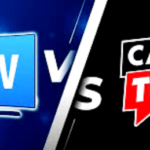[ad_1]
What is IPTV?
IPTV, or Internet Protocol Television, is a method of delivering television programming and other video content over the internet, rather than through traditional terrestrial, satellite, or cable format. This technology allows users to stream content in real-time, essentially allowing viewers to participate in a more interactive and personalized viewing experience.
The Evolution of Television
Television has come a long way since its inception. From black-and-white broadcasts to color, and later to High Definition (HD) and 4K streaming, the medium has evolved dramatically. The rise of the internet has brought about another significant transformation, turning conventional television into a more flexible and accessible format through IPTV.
How Does IPTV Work?
IPTV works by sending video content through your internet connection. It uses a set of internet protocols (TCP/IP) to transmit the video and audio data, allowing for data packets to be streamed in real-time. Here’s how it generally works:
- Content Source: IPTV content is sourced from various providers and streaming services.
- IPTV Middleware: This is the software layer that manages all of the streaming services and user experiences.
- Content Delivery Network (CDN): CDN distributes the content across various servers to ensure that users receive data from the closest point, improving load speeds.
- User Devices: Users can access content on various devices including smart TVs, smartphones, tablets, and computers using IPTV apps or web interfaces.
Types of IPTV Services
IPTV services can be categorized into three main types:
- Live Television: This offers real-time broadcasting from various channels, akin to traditional cable TV.
- Video on Demand (VOD): Users can select and watch videos from a library whenever they choose, without adhering to a broadcast schedule.
- Time-Shifted TV: This allows users to watch previously aired shows at their convenience, giving them the flexibility to catch up on what they missed.
Advantages of IPTV
IPTV boasts several advantages over traditional television methods, including:
- Flexibility: Users can watch shows on-demand, allowing them to watch what they want when they want.
- Multi-Device Streaming: IPTV can be accessed across various devices, including smartphones, tablets, and smart TVs.
- Interactive Features: IPTV offers features such as video-on-demand, pause/rewind live TV, and instant replay.
- Cost-Effectiveness: Often, IPTV services can be more affordable than traditional cable or satellite packages.
- Greater Content Variety: Numerous channels and services are available, catering to various tastes and preferences.
How to Get Started with IPTV
Getting started with IPTV is straightforward. Here’s a step-by-step guide:
- Search for an IPTV Provider: Research and find an IPTV service that suits your needs and budget.
- Subscribe to a Plan: Most providers offer various plans based on channel selection and streaming quality.
- Set Up Your Device: After subscription, install the necessary app on your device or set up through your smart TV.
- Enjoy Streaming: Launch the app, sign in, and start watching your favorite shows and channels!
Challenges and Considerations of IPTV
While IPTV offers many advantages, there are also challenges to be aware of:
- Internet Dependency: A reliable internet connection is critical for optimal performance—poor connections can lead to buffering and interruptions.
- Content Legality: Ensure your IPTV provider has the correct licenses for the content they offer to avoid legal issues.
- Quality Variations: Quality can differ significantly between providers, so research is crucial.
Conclusion
IPTV is revolutionizing the way we consume television and video content. With its ability to provide flexible, on-demand viewing across various devices, it’s no wonder that more and more people are turning away from traditional cable systems to embrace this modern solution. While challenges exist, the benefits of IPTV—such as extensive content libraries, affordability, and interactive features—make it a compelling option for anyone keen on seamless streaming and a tailored viewing experience. As technology continues to evolve, IPTV is sure to remain at the forefront of the entertainment industry.
Frequently Asked Questions (FAQs)
1. Is IPTV legal?
IPTV is legal as long as the service provider has the necessary licenses and rights to distribute the content. Always check the legality of your chosen service.
2. Do I need a special device to use IPTV?
No, you can access IPTV services on a variety of devices, including smart TVs, computers, tablets, and smartphones, provided you have the appropriate app.
3. Can I watch live sports on IPTV?
Yes, many IPTV providers offer live sports channels, but the availability of certain events can vary depending on the provider.
4. What internet speed do I need for IPTV?
To enjoy IPTV smoothly without buffering, a minimum broadband speed of 5 Mbps is recommended. Higher speeds may be required for HD or 4K streaming.
5. Can I record shows with IPTV?
Some IPTV services offer cloud DVR features that allow you to record shows, but this depends on the provider. Always check the details of your plan.
[ad_2]

